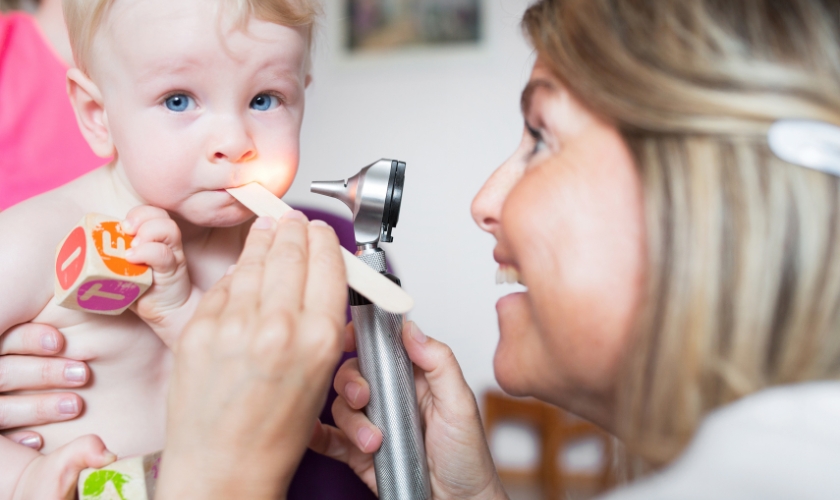6 Months Baby’s First Dental Checkup in Spokane Valley, WA

Why is 6 months the ideal time for a first dental visit in Spokane Valley?
While your baby might not have any teeth yet at 6 months, this is the perfect time to establish a positive dental experience in Spokane Valley. A pediatric dentist can:
- Examine your baby’s gums for any signs of irritation or infection.
- Offer guidance on oral hygiene practices, even before teeth erupt.
- Detect any potential developmental issues early on.
Benefits of early dental checkups for baby’s oral health
Regular dental checkups from infancy provide numerous advantages:
- Prevention of cavities: Early detection of tooth decay can prevent more serious problems in the future.
- Healthy tooth development: A kids dentist can monitor your baby’s teeth as they grow in, ensuring proper alignment and development.
- Good oral hygiene habits: Establishing good oral hygiene practices from a young age sets a strong foundation for lifelong dental health.
How dental issues in infancy can affect future oral health
Neglecting oral care during infancy can lead to various dental problems:
- Cavities: Early childhood caries (ECC) is a serious condition that can cause pain, infection, and even tooth loss.
- Difficulty eating and sleeping: Toothaches can interfere with your baby’s ability to eat and sleep comfortably.
- Speech impediments: Dental issues can affect a child’s speech development.
- Low self-esteem: Visible dental problems can impact a child’s self-confidence.
What to Expect at the 6-Month Dental Checkup in Spokane Valley, WA
Your baby’s first dental visit is a new experience for both you and your little one. Understanding what to expect can help alleviate any anxiety and ensure a smooth visit.
The checkup process: step-by-step breakdown
The actual checkup is usually quick and gentle. Here’s a general idea of what to expect:
- Examination: The pediatric dentist near Spokane Valley, WA will carefully examine your baby’s mouth, gums, and any teeth that have erupted.
- Cleaning: If your baby has teeth, the dentist will gently clean them with a soft cloth or brush.
- Fluoride application: In some cases, the dentist may apply a fluoride treatment to strengthen the teeth.
- Oral hygiene instructions: You’ll receive personalized guidance on how to care for your baby’s oral health at home.
What to bring to the appointment
To make the visit as smooth as possible, remember to bring:
- Your baby’s insurance information
- Your baby’s immunization records
- A favorite toy or pacifier to comfort your baby
Common questions parents ask
It’s natural to have questions about your baby’s dental health. Here are some common ones:
- Will my baby be scared? Many babies are apprehensive about new experiences, but the dentist is trained in child care and will handle your baby gently.
- How long does the checkup typically take? The initial visit usually takes about 15-20 minutes.
- Will my baby need shots? No, dental checkups do not involve vaccinations.
How long does the checkup typically take?
The initial dental checkup for a 6-month-old in Spokane Valley, WA, typically takes around 15-20 minutes. However, this can vary depending on your baby’s behavior and any specific concerns the dentist may have.
Will my baby be scared? Tips for calming your baby
It’s normal for babies to feel anxious during a dental visit. Here are some tips to help calm your baby:
- Bring a favorite comfort item: A pacifier, blanket, or toy can provide reassurance.
- Maintain a calm demeanor: Your baby can sense your emotions, so try to stay relaxed.
- Offer praise and comfort: Positive reinforcement can help create a positive dental experience.
Oral Hygiene at Home: Tips for Parents
Establishing good oral hygiene habits early on is crucial for your baby’s dental health. Here are some essential tips:
Proper brushing techniques for infants
- Before teeth erupt: Gently wipe your baby’s gums with a clean, damp washcloth after feedings.
- Once teeth appear: Use a soft-bristled infant toothbrush with a small head. Brush gently twice a day, using water only. Avoid toothpaste until your child is two years old.
Fluoride supplements: necessary or not?
Whether or not your baby needs fluoride supplements depends on your water supply. Your dentist can assess your baby’s fluoride intake and recommend the best course of action.
Pacifiers and thumb-sucking: impact on teeth
Prolonged pacifier or thumb-sucking can affect the alignment of your child’s teeth. While it’s normal for babies to use these for comfort, try to limit their use and wean your child off them gradually.
Teething: symptoms, relief, and dental care
Teething is a normal phase characterized by discomfort, drooling, and swollen gums. To soothe your baby, you can offer:
- Cold teething rings
- Gentle gum massages
- Over-the-counter pain relievers (consult your pediatrician)
Remember, teething is not a direct cause of cavities, but poor oral hygiene during this time can increase the risk. Continue brushing your baby’s teeth or gums regularly.
Choosing the Right Pediatric Dentist
Finding the right pediatric dentist for your baby is essential for their oral health. Here’s what to consider:
Qualities to look for in a pediatric dentist
A good pediatric dentist should:
- Specialize in caring for infants and children.
- Have a gentle and calming demeanor.
- Be patient and understanding of parents’ concerns.
- Offer a child-friendly environment.
- Be up-to-date on the latest dental care techniques.
Importance of a flexible schedule for appointments
A dentist with a flexible schedule in Spokane Valley can accommodate your baby’s needs, especially if they have a sensitive temperament. Look for a practice that offers early morning, late afternoon, or weekend appointments.
How to find a dentist who accepts your insurance
Many dental insurance plans cover pediatric care. When choosing a dentist, verify that they accept your insurance to avoid unexpected costs. You can also contact your insurance provider for a list of in-network dentists.
A Healthy Start for a Healthy Smile
Starting your baby’s dental care early is a cornerstone of their overall well-being. By scheduling that first checkup at six months, you’re laying the foundation for a lifetime of healthy smiles. Remember, every smile starts small. With consistent oral hygiene practices at home and regular dental visits, you’re setting your child up for a bright future.
Don’t hesitate to reach out to your pediatric dentist in Spokane Valley with any questions or concerns. Early intervention is key to preventing dental problems. Your baby’s oral health is in your hands, so let’s make it a shining example!
Frequently Asked Questions
While it’s beneficial to initiate oral hygiene practices early on, the American Academy of Pediatric Dentistry recommends a dental visit within six months of the first tooth eruption or by the child’s first birthday. This allows for early detection of potential dental issues like caries and establishes a positive dental experience for the child.
This early intervention allows for the prevention of oral diseases, such as early childhood caries, by detecting potential issues and establishing proper oral hygiene practices.
Typically, the first teeth to emerge around six months are the lower central incisors, often referred to as the bottom two front teeth. These deciduous, or “baby,” teeth initiate the process of mastication and mark a significant developmental milestone for infants.



